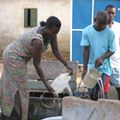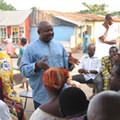|
在西非,有個叫做迦納的國家,地理位置就處在非洲大陸的下巴部位,其境內有一非常大的湖泊──伏爾塔湖,盤踞在這個國家的中部。雖然在迦納水源隨處可見,但是據估計大約有70%的迦納人還是缺乏乾淨的飲用水。魯道夫•阿曼嘉─埃特古,一位年約40歲的律師,決意要改變現況。

阿曼嘉─埃特古(攝影:Dave Wendlinger)
對於阿曼嘉─埃特古來說,最難以跨越的障礙是水源民營化的問題,尤其是世界銀行和國際貨幣基金組織(IMF)的大型水源民營化專案。也因此,他動員了迦納的勞工團體、農民以及許多迦納的百姓,一起投入反抗世界銀行和IMF在迦納推動水源民營化的計畫。2003年初,因為公眾壓力,政府同意停止該專案。目前,阿曼嘉─埃特古是迦納一家非營利組織「社會整合發展中心」的主席,他的夢想是希望在2010年時,讓每個迦納人都可以取得安全的飲用水。
阿曼嘉─埃特古的工作要冒很大的險。在政風極度混亂的1980年代
,他曾入獄多次且躲躲藏藏了7個月。現在的迦納有一個穩定且民主的政府,環境也比較安全,但他認為他仍然是在國家情報局的黑名單中。
阿曼嘉─埃特古於2004年4月19日在加州舊金山獲頒環保金人獎。他說他會將一部份獎金用來建設自己家鄉的水庫,一部份則用來結合國內的有志之士。而以下即為他接受舊金山Grist
Magaizne訪談的內容。 |
The western African nation of Ghana, tucked under the chin of the
continent, is dominated by the enormous Lake Volta, a sprawling
reservoir that arcs through the midsection of the country. Though there
appears to be water, water everywhere, an estimated 70 percent of
Ghana's people lack access to clean, piped drinking water. Rudolf
Amenga-Etego, a 40-year-old Ghanaian attorney, is determined to change
that. To Amenga-Etego, the biggest obstacle to wider water access is water
privatization, especially large-scale privatization schemes backed by
the World Bank and the International Monetary Fund. He recently
mobilized labor unions, rural residents, and many other Ghanaians to
oppose a World Bank and IMF push for water privatization in Ghana. In
early 2003, in the face of public pressure, the government agreed to
suspend the project. Now, as the director of the Globalization Response
Program for a Ghanian nonprofit organization called the Integrated
Social Development Center, Amenga-Etego is campaigning to make safe
drinking water available to everyone in the country by 2010.
Amenga-Etego's work carries serious risks. As a student activist in
Ghana in the politically chaotic 1980s, he was jailed many times, and
spent seven months living in hiding. Ghana now has a more stable and
democratic government, and Amenga-Etego is able to work in relative
safety, but he says he is still watched by members of the national
intelligence bureau.
Amenga-Etego was awarded one of six 2004 Goldman Environmental Prizes
in a ceremony in San Francisco, Calif., on April 19. He says he will
spend some of the prize money on a reservoir for his own community, and
will use the rest of it to network and coordinate activists throughout
Ghana. He spoke to Grist from San Francisco. |
|
問:請告訴我們,在缺乏潔淨飲用水的迦納,對人民會造成多大的影響呢? 答:安全用水是家庭的生活必需品。缺水會影響到對愛滋病與結核病患者和嬰孩的照顧,並且會使得居家衛生更難維持。缺水甚至會引發傷寒及霍亂等疾病──在我國有70%的這類疾病都是由水所傳染的。婦女必須要走很遠的路去尋找水源,通常都是年輕女孩在負責──當然也因此失去了許多寶貴的求學機會,所以這更影響了我國婦女的教育程度。

迦納首都阿克拉的水井中取出的美好水源。(攝影:Will Parrinell)
問:IMF與世界銀行的行動是如何影響到您所說的這些問題呢?
答:他們的影響很大。在他們涉入之前,我們藉由工商界和一些都市精英,定期幫助那些無力買水的低收入戶。世界銀行與IMF提出一個所謂的需求導向的策略,並聲明水源只會提供給那些有能力付得出錢的家庭。而水系統的民營化是作為他們資助迦納恢復與擴大供水系統的條件,但民營化帶來的價格上漲,卻成了另一個更難以跨越的障礙。
問:什麼原因驅使您將所有的心力放在水資源的這個問題上呢?
答:首先,我生活在一個貧困的社區,很清楚每天找水的痛苦,而這件事也深深的刺痛了我的良心。身為一位律師,常會有許多人前來找我幫忙,因為他們無力買水,常因偷接水管而遭到水公司起訴。這些人生活在一個沒有錢、沒有任何公共設施,隨時會被控訴以及精神遭受創傷下的一個環境。如果你跟這些人處於同一種情況下,自然會想要有所改善。這也促使我想要去找出問題的癥結,而我發現了癥結就是水源民營化,我就認定這是我們要據理力爭的事件之一了。
問:您認為您最成功的對策是什麼呢?
答:我認為最成功的一件事,就是將勞工運動與貧困的社區結合在一起,而透過示威抗議,表示再也不能忍受水源民營化成為他們生活中的一部分了。民眾大約每兩個月會舉行一次大型集會或遊行抗議,來藉此表達他們的憤怒、挫折,以及抗議民營化和世界銀行與IMF的干預。
這樣的遊行,也得到了政府的回應。每個政府都想要得到權力,所以他們也知道支持水源民營化將會使他們成為不受歡迎的人物。在我國的跨國企業也發現到每個人都反對,且瞭解在這個國家工作下去只會愈來愈不舒服。整件事的關鍵,在於國際間的結盟,我們曾和美國及英國的組織一起合作過,那裡是跨國企業的母國,這些組織會在當地對其總公司以及IMF抗議。
問:您對於飲用水的管理及分配有何見解?
答:因為水源是如此的重要,它本身就是生命,所以水更應該是屬於人民的。社會都應該要負起水污染及其它的問題的責任,如果水源落入私人的手裡,那麼水公司只需要對股東負責就行了。水源應該是被社會大眾所共同管理的,這樣可以避免腐敗,確定權責,以及用民主的方式來處理表現不良的主管。

阿曼嘉─埃特古向迦納民眾說明水源永續經營的問題。(攝影:Will Parrinello)
因為世界銀行中止了對水源民營化的計畫,所以迦納大部分的水仍然是社會大眾的,在迦納有個叫賽夫盧谷的地方,那裡的人民跟「迦納公眾」水公司有著很好的合作關係──而這也就是我們所謂「公眾對公眾」的伙伴關係,社區協助收費、配水和定價,水公司方面就負責監控水質。3年來水費沒有一戶漏繳,所以我們也以此作為一個經營上的典範。
問:您認為有任何水源民營化後可能會改善飲用水的案例嗎?
答:如果水的價格是讓市場自由決定的話,因為水的需求是永遠在的,所以水價將會持續上漲。但如果水是人民所有,則我們絕對不容許由市場來決定水價,所以我不認為這是有效分配水源的制度。
問:您對於其他國家或都市的水源民營化計畫有什麼看法?
答:我總是告訴他們,首先且最重要的:社會大眾必須有水源的所有權,人民必須透過自己所選出的代表,來主張水該如何經營及被誰管理的。另一方面,社會大眾必須共同協助水公司──最好是公營,民眾也必須展現出公民的責任,漏水要通報,浪費水也要通報。最後也相當重要的是,應該要低價或是免費供水給社區內的窮苦家庭。而如果社區有老人及或愛滋病患之家,我們應當分擔起照顧的工作,這也是我們對其他人民的責任。
問:我知道您因為從事政治活動而坐過牢,因此轉為地下工作,促使您繼續這項志業的信心是來自於哪裡呢?
答:在我的國家,你會看到許多揹著嬰兒的女人,到處在找安全乾淨的水源。除非你有一顆極度冷酷無情的心,才能不去同情他們。你看我們被剝奪了那麼多,我們在首都阿克拉多次為水走上街頭──看到這麼多人上街,你無法視而不見。
問:你們現在面臨最急迫的議題是什麼?
答:世界銀行堅持應該要先簽訂一份長達5年的公共設施管理契約。我們認為這份契約的目的,只是為了對民眾降溫,為了讓他們看起來似乎已無意推行水源民營化。但這份契約其實只是民營化的另一種形式,因為他們準備將管理權交給跨國公司。今(2004)年是我國的選舉年,因此我們打算造訪許多選區,要求人們不要將票投給那些支持水源民營化的人。
問:在美國的熱心朋友,要如何來協助您呢? 答:第一,是因為我們必須和IMF及世界銀行打交道,因此民眾必須去面對他們,而且要求基本的公共設施必須無條件貸款。其次是與我們分享他們的研究心得,這有助於我們的活動。例如,如果有新技術可以輕易廉價的供水的話,這將會有助於我們論述來說服政府。
問:獲得環保金人獎對您有什麼意義? 答:當你在一個貧窮黑暗的國家工作,你不知道誰會在關心。這個獎對我和我的同事來說是種榮耀,我們很高興終於有些人認同我們的工作。而所獲得的獎金也更將有助於發展我們的行動版圖──當然我們也希望能因此更有能力去對抗世界銀行及IMF。 |
Grist: Please describe how the lack of clean drinking water impacts
Ghanaians. Amenga-Etego:
It's what they need for the care of their household. The lack of
it affects the care of patients who have HIV and tuberculosis, it
affects the care of babies, and it makes it more difficult to take care
of sanitation in the home. The lack of clean water causes typhoid and
cholera -- 70 percent of the disease in the country is waterborne. Women
have to walk long distances to find water, and girls -- who are mostly
responsible for getting water -- certainly lose time in terms of school
hours, so it affects the overall educational standards of women.
Grist: How have these problems been affected by the actions of the
IMF and World Bank?
Amenga-Etego: They have played a major
role. Before they got involved, we had a system where industries and
elites in cities paid a little more to subsidize the water consumption
of rural folks, the lower-income segment of society. The World Bank and
IMF have introduced what they call a demand-driven policy, where water
will only go to households that pay for it. Privatization of water
systems was a condition for giving Ghana a grant to rehabilitate and
expand its water systems, and privatization brought about huge price
hikes and created another barrier to access.
Grist: What led you to focus your energies on this problem?
Amenga-Etego: First of all, I live in a
community that is poor, so I see firsthand how people struggle in their
daily lives just to access water. This pricks my conscience. As an
attorney, I've had occasions where neighbors came to consult me -- they
had been unable to pay for their water, so they had reconnected their
system illegally and been written to by the company. They were living
with the whole cycle of no money, no service, and the threat of
prosecution and psychological trauma. If you live with these people, you
can only be moved to want to assist. That led me to get to the cause of
the problem, and I found it was water privatization, so I decided that
was one of the things we had to fight.
Grist: What's been your most successful strategy?
Amenga-Etego: I think the most
successful thing was getting the labor movement to act in conjunction
with poor communities, issuing statements of protest and making it very
clear through demonstrations that they can no longer accept
privatization as part of their lives. About once every two months, there
is a march somewhere or a major rally where the community meets and
expresses anger and frustration about privatization and World Bank and
IMF interference.
That got a response from the government. Every government wants to be
voted into power, and they knew that privatization would make them
unpopular. Multinational companies saw that everyone was saying no, and
they knew that it would be uncomfortable working in the country. The key
was international solidarity -- we collaborated with groups in the U.S.
and the U.K., where the multinationals come from, and those groups were
protesting at company headquarters and against the IMF.
Grist: How do you think drinking water should be managed and
distributed?
Amenga-Etego: Because water is so
essential -- it's life itself -- water ought to be in public hands.
Communities should be able to hold officials accountable for pollution
or other problems -- if you leave it in private hands, the companies are
accountable only to shareholders. It should be publicly managed, but
with the involvement of communities. The community involvement checks
corruption, assures accountability, and assures democratic action if the
officers don't perform.
Because the World Bank backed out of privatization, the majority of
water in the country is still public. There is a community in Ghana
called Savelugu where the community came into partnership with [the
Ghana public] water company -- it's what we call a public-public
partnership. The community does all the collection [of fees] and the
distribution, and it does all the pricing. The company is responsible
for checking the water quality. There's been 100 percent collection for
the last three years, so we use that as an example.
Grist: Do you think there are any cases where privatization could
improve access to water?
Amenga-Etego: If the price of water is
left to the market to determine, there will always be a demand for
water, so the price will continue to be pushed up. So if water is a
human right, then we cannot allow the price to be determined by market.
I cannot see it as an efficient allocator of water.
Grist: What do you say to other countries and cities dealing with
their own water-privatization proposals?
Amenga-Etego: I always tell them, first
and foremost: The community has to have ownership. The community must,
through its elected representatives, have a say in how the water is
managed, and by whom. The other thing is that the community must be
responsible enough to help the water supplier, which is hopefully a
public supplier -- the community must show civic responsibility by
reporting leaks in pipelines, places where water is wasted. Last but not
least, there should be the ability to provide water at very low prices
or free to members of the community who cannot pay. If there is a home
for the aged, or for people with HIV, we should share the burden to
ensure that such groups are taken care of. That's a matter of our duty
to other human beings.
Grist: I understand you have been jailed and forced underground
because of your political work. Where have you found the inspiration to
continue?
Amenga-Etego: In my country, when you go
out there, you see poor women with babies on their backs, walking along
and looking for safe water. You need to have a really, really, really
hard heart not to sympathize. There's so much deprivation. The water
marches that we do in Accra -- you can't see all those people marching
in the streets and abandon them.
Grist: What is the most pressing issue your group is facing now?
Amenga-Etego: The World Bank has
insisted that it should put in place a management service contract for
five years. We think the management service contract is meant to cool
down tempers, to make it look like they are no longer doing
privatization. But the management service contract is a form of
privatization, because they're going to give the management to
multinational corporations. This is an election year, so we are going
around to various electoral areas and asking people not to vote for
those who support the privatization of water. Grist: How can
activists in the United States help your cause?
Amenga-Etego: The first thing is that
because we're dealing with the IMF and the World Bank, people need to
confront these institutions and demand that loans for essential services
should be condition-free. The other thing they can do is share their
research on issues that will aid our campaign. For instance, if there's
a new technology that will supply water simply and cost-effectively,
that would help us make our argument, help us convince the government.
Grist: What does this award mean to you?
Amenga-Etego: When you are working in a
poor, obscure country, you don't know that anyone's listening or
watching. It's an honor for me and my colleagues -- we're happy to know
that someone has recognized our work. The resources will help us in
expanding our networks -- we hope to increase our capacity and our
ability to confront the World Bank and the IMF. |
